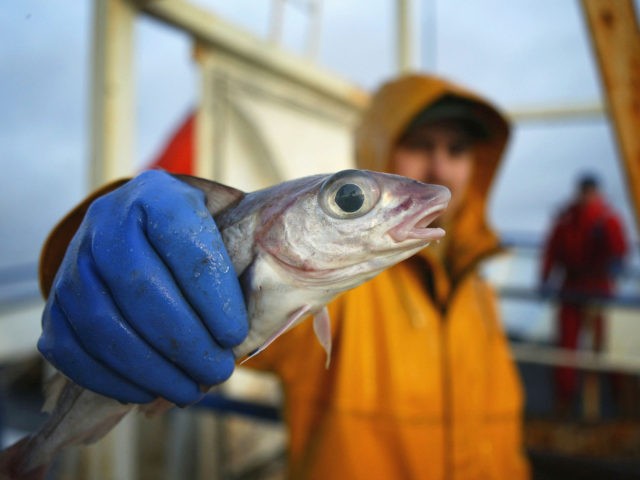Britons face a sharp increase in the cost of basic staples as a consequence of the sanctions war with Russia, with the price of whitefish set to significantly rise.
Instead of a weekly treat, the quintessentially British dish of fish and chips could now become more of a delicacy as whitefish supply prices — which includes cod and haddock — are predicted to rise by 20-30 per cent as a ramification of the sanctions war Britain is engaged in with Russia.
While the sale of whitefish is not explicitly restricted in the current sanctions imposed on Russia, new banking sanctions and paperwork requirements have disrupted the import of fish from Russia, which makes up roughly 30 per cent Britain’s whitefish market.
Britain’s fish addiction is largely propped up by foreign imports, with an estimated 430,000 metric tonnes of whitefish being imported in 2020 compared to 47,000 tonnes caught domestically, POLITICO reports.
Alongside fish, the United Kingdom’s wheat imports may be affected by the conflict, and Britons are set to see a 20 per cent increase in price per loaf as a consequence of the conflict, as Breitbart previously reported.
This wheat disruption could also impact the cost of one of fish suppers, as flour is one of the key ingredients in the batter for fried fish.
Britain’s chip shop industry was already under strain before Russia invaded Ukraine, with industry experts predicting up to a third of chippies could close due to decreased custom caused by a combination of coronavirus regulations, which decimated profits in 2020-2021, and a 7.5 per cent rise in value-added tax from April.
Alongside wheat and bread, a multitude of other British food items have increased in price, with it being reported that food inflation was around 4.3 per cent in February.
There are also fears of rising food costs in Europe, as Russia and Ukraine account for a large share of the world’s grain supplies, which alongside causing increased bread and flour costs has the potential to impact European livestock farming, as a sizeable amount of their grain feed comes from Ukraine.
The European Union’s domestically-grown crops could also be affected by sanctions, as the European agricultural industry is heavily reliant on Russian fertiliser.
In a shortage that has stark similarities to the start of the coronavirus pandemic, Europeans should also brace to be hit by toilet paper shortages. Toilet paper requires a lot of energy to produce, so with rising energy costs there is a risk production may be impacted, which could trigger panic-buying.
Already some Italian paper mills have already ceased production due to rising energy prices, as the cost of natural gas has risen to €120 per megawatt-hour.
This has prompted some in the European Union to call for more investment in “green” energy, with Frans Timmermans, executive vice-president for the European Green Deal, calling for the EU to “dash into renewable energy at lightning speed” — which will supposedly provide more energy security.
“Renewables are a cheap, clean, and potentially endless source of energy and instead of funding the fossil fuel industry elsewhere, they create jobs here”, Timmermans claimed.
There are fears that Vladimir Putin’s war on Ukraine could cause global food prices to rise by 20 per cent, with the Italian Food and Agriculture Organization (FAO) warning that Ukraine may not be able to harvest crops at all this year.
This could cause serious consequences, with the FAO warning that “the global number of undernourished people could increase by 8 to 13 million people in 2022/23,” with the Asia-Pacific region, sub-Saharan Africa, the Near East, and North Africa facing the brunt of the expected food shortages.

COMMENTS
Please let us know if you're having issues with commenting.